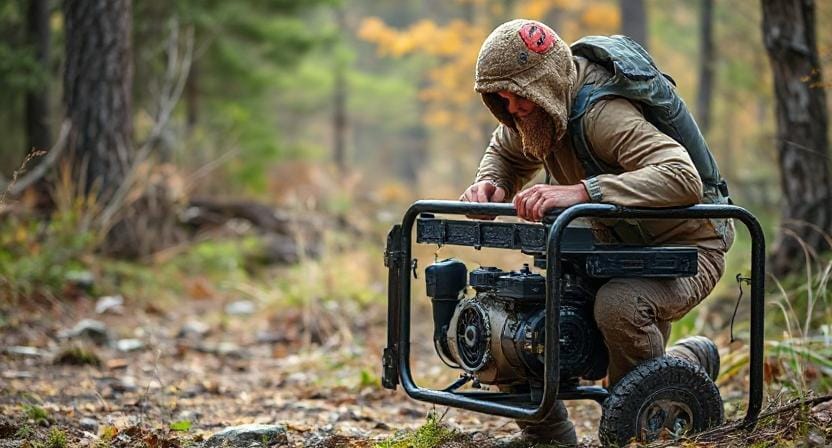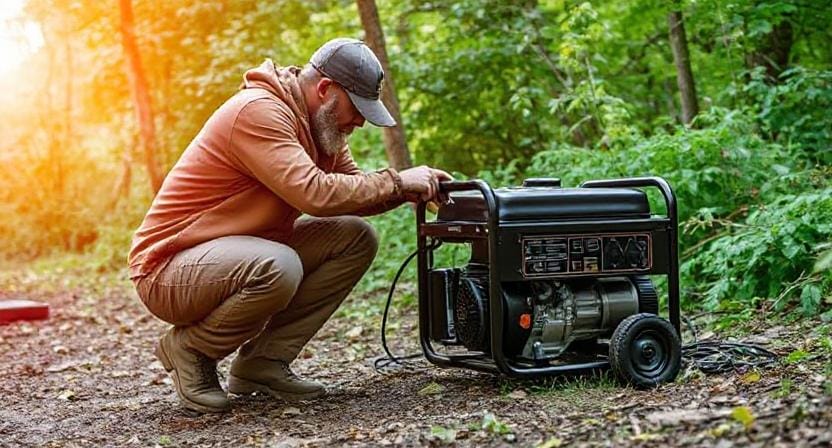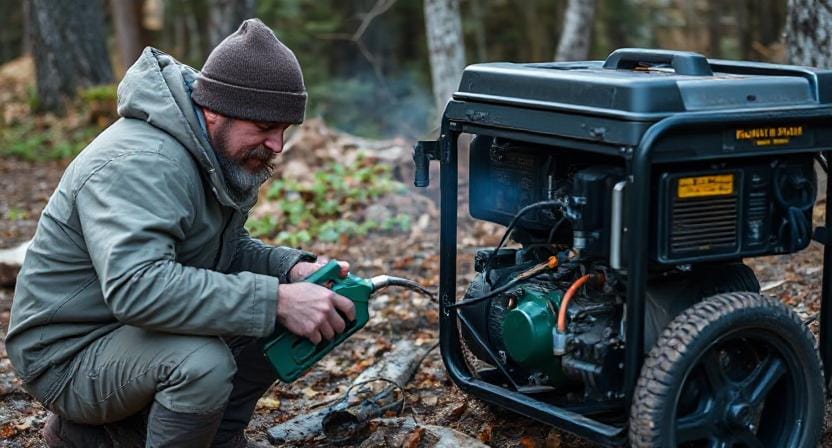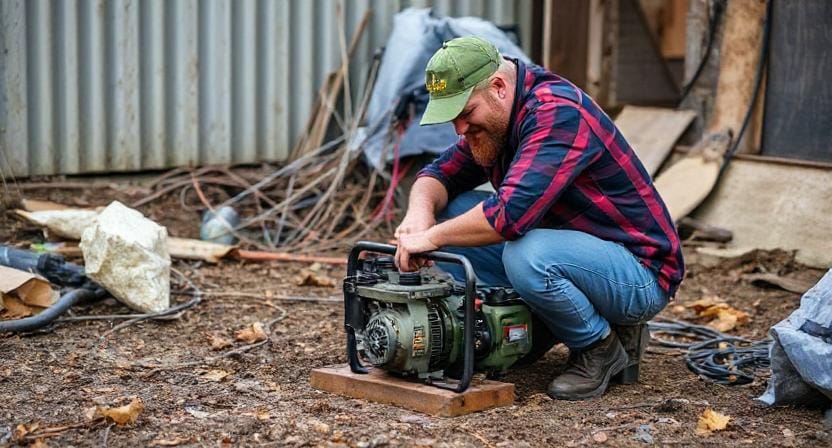Last Updated on November 1, 2025 by Kevin Collier

Top Takeaways and Key Concepts
Assess Your Power Needs: Calculate wattage requirements for essential appliances like refrigerators and medical devices.
Choose the Right Generator Type: Select between portable, inverter, or standby generators based on your needs.
Ensure Proper Ventilation: Operate generators outdoors to prevent carbon monoxide buildup indoors.
Maintain Fuel Supply: Store enough fuel for at least 24 hours of operation.
Regular Maintenance: Run your generator monthly for 10 minutes to ensure functionality.
When the lights go out, it’s like a giant “Surprise!” from Mother Nature. One minute you’re cozy, and the next, it feels like you've stepped back in time. Your fridge? Just a fancy cooler now. Wi-Fi? Forget it! It’s about as far away as Mars.
Please Note: This post may contain affiliate links. If you click one of them, we may receive a commission at no extra cost to you. As an Amazon Associate, I earn from qualifying purchases.
But don’t worry! We can handle this. Let’s talk about backup power and generators so you’re ready for whatever happens. Who says we can’t have fun while getting prepared?
First up, let’s chat about generators. These little machines can help keep your home running. They’re kind of like superheroes, swooping in to save the day when you need them. You can find quiet ones, too—perfect for those sleepy nights when all you want is calm. But choose one that fits your needs. Some power just a few lights and a fridge, while others can run the whole house.
Then there’s the fuel part. Some generators use gas, and others run on propane. Knowing what yours needs is super helpful. Keeping extra fuel around means you won’t run out when the lights go off. Just make sure to store it safely!
When planning, create an emergency kit. Flashlights, batteries, snacks—pack it all! That way, if the lights go out, you’ve got everything at your fingertips.
It’s not just about power, either. How about some creative ways to stay entertained? Think board games, books, or cozy blankets for snuggling up. Sure beats scrolling through your phone in the dark!
Remember, safety comes first. Don’t run generators inside. We want to keep the air fresh and clean. It’s like inviting nature inside, not pollution.
With a little prep, you can turn that “surprise” into an adventure! Embrace it like your favorite dad joke at family reunions. When you’re ready for anything, even a blackout can be fun. So gather those supplies, and let’s keep the lights on—or at least have a great time when they go out!
*** Shop for Survival Gear - Tools - Kits ***
Survival Gear - Bags and Backpacks - Knives - Boots/Footwear - Communication
Outdoor Cooking - Gloves - Hydration - Dry Boxes - Water Filtration Systems
Tents - Sleeping Bags - First Aid Kits - Multi-Tools - Flashlights - Fire Starters
Navigation - Survival Food - Night Vision - Headlamps - Stun Guns - Binoculars
Understanding Your Power Needs

Before you rush out to buy the biggest generator on the market—one that could probably power an entire football stadium—you need to figure out what you actually require. It’s like going grocery shopping when you’re hungry; if you don’t make a list, you might end up with ten boxes of cereal and no milk.
Start by assessing which appliances are essential during an outage. Do you really need to power that fancy espresso machine? Or can you survive on instant coffee for a couple of days?
Make a list of must-haves: refrigerator, medical devices, maybe even your beloved gaming console (hey, we all have our priorities). Then calculate their wattage requirements using an online calculator or the trusty old label on the back of each device.
By the way, remember that some appliances require more power to start than they do while running. Think about your refrigerator—it might take 2,000 watts to kick off but only needs around 600 watts while humming along happily. Keep this in mind unless you're keen on accidentally launching your generator into orbit.
Types of Generators: Pick Your Power Poison

Let’s see—the world of generators is vast! You’ve got portable generators that are great for camping trips or tailgating (because who doesn’t want hot dogs while watching their team lose?). Then there are standby generators that sit quietly outside your house until disaster strikes—like a superhero waiting for its moment.
Portable generators are usually gas-powered and can be moved around easily. They’re perfect for short-term use but come with noise levels akin to a herd of angry elephants.
If you're planning on using one at home during an outage, expect your neighbors will either love or hate you depending on how well they enjoy “nature's symphony.”
On the other hand, standby generators are connected directly to your home’s electrical system. When the power goes out, they automatically kick in faster than I can say “where did I put my flashlight?”
They tend to be quieter but cost significantly more upfront. So it boils down to whether you're willing to spend big bucks for convenience—or if you'd rather save money and deal with cranky neighbors.
Installation: DIY or Call in Reinforcements?

Now that you've decided which type of generator suits your lifestyle better than sweatpants after Thanksgiving dinner, it's time for installation decisions. Are you feeling adventurous enough for some DIY action? Or would calling in professionals sound more appealing?
If you're going down the DIY route (cue dramatic music), ensure you've done thorough research first! YouTube tutorials can make anyone feel like Bob Vila but remember: those videos rarely show what happens when things go wrong—like being shocked because someone didn’t turn off the main breaker before getting started!
For those less inclined toward electrical gymnastics (and frankly wise enough), hiring professionals may be worth every penny spent. They’ll not only install it correctly but also ensure everything meets local codes—unlike my attempts at building IKEA furniture without reading instructions.
Fueling Your Generator: Gas vs Diesel vs Solar

Alright folks, let’s talk fuel—the lifeblood of any generator operation! The most common choices include gasoline, diesel fuel, or even solar panels if you're feeling particularly eco-friendly (or hipster).
Gasoline is convenient since it's readily available almost everywhere; however, storing it requires caution since it has a shelf life shorter than some reality TV stars’ careers.
Diesel fuel lasts longer but tends to be pricier—and let me tell ya from experience; nothing says “I’m prepared” quite like trying unsuccessfully not to spill diesel all over yourself while filling up containers!
Solar-powered generators have been gaining popularity lately too—but they aren’t quite ready yet for powering entire households during blackouts unless paired with large battery systems capable enough of storing energy produced throughout sunny days.
So ask yourself: How much work am I willing/able/wanting-to-do when things go dark? Each option comes with pros and cons galore!
Maintenance Tips: Keep Calm and Carry On

Once you've invested in backup power equipment worthy enough of becoming part-time members of your family (who needs pets?), regular maintenance becomes crucial if you want them functioning reliably when needed most!
Every month or so—yes folks; mark those calendars!—check oil levels just like you'd check on Grandma's prize-winning roses after she leaves town for vacationing somewhere tropical again… Change filters regularly too since nobody wants dirt gunking up machinery when it matters most!
And speaking from experience here: always run tests periodically so everyone knows how long it'll take before having pizza delivered becomes impossible due solely because Dad forgot where he put his emergency contacts list…again!
Conclusion: Stay Prepared and Laugh Through It All
Okay, we're almost there! Just a little more. Let's keep talking about ways to provide backup power. Knowing what to do when the power goes out might help keep your family safe and busy. Who wouldn't want that?
The next time someone asks you why their phone charger isn't working during a power outage, you will have some good advise ready. Don't forget to discuss about employing generators or battery packs and assess your power alternatives. It's wonderful to know!
It's smart to think about what you really need. Don't just grab the first cool device you see. Make some plans. Some people need additional power for their medical equipment or refrigerators. Some people only want to keep a few lights on. It helps to know what works for you.
You also need to keep everything in great shape. If you take care of your generator or battery regularly, they'll be ready when you need them. Like a good friend, right?
Yes, it's true. We can't control when the lights go out or what happens in nature, but we can be ready for it. And as we do, let's not forget to have some fun along the road. It makes the trip better.
So, let's go on this expedition together with a warm blanket. You can handle anything that comes your way if you're ready!
Frequently Asked Questions
How do I calculate how much generator power I need?
List essential appliances, note their wattage, and include extra surge watt capacity for devices like refrigerators that draw more at startup.
What generator type is best for home emergency use?
Portable units work for short-term outages, standby models automatically power a home, and inverter generators provide quieter, cleaner output for electronics.
Why must generators be run outdoors?
Generators produce carbon monoxide, so outside operation with ventilation is required to avoid deadly indoor buildup.
How much fuel should I store?
Keep enough fuel to run at least 24 hours of essential operation, stored safely in appropriate approved containers.
How often should a generator be run for maintenance?
A monthly 10-minute test run helps keep systems lubricated, ensures electrical components cycle, and confirms reliable startup.
Do generators need emergency kits too?
Yes. Flashlights, spare oil, extra filters, extension cords, and batteries make troubleshooting faster during outages.
Which fuels work for generators?
Gasoline, diesel, and propane are common options—choose based on storage safety, cost, and generator compatibility.
Suggested Resources:
Backup Power Solutions
https://www.backuppowersolutions.com
Choosing The Right Generator
https://www.generatortips.com
Emergency Preparedness Basics
https://www.ready.gov/emergency-preparedness

Kevin Collier is a seasoned survivalist and expert in prepping and homesteading, contributing to WiseSurvive.com. With a deep-rooted passion for self-sufficiency and outdoor survival skills, Kevin shares practical advice, strategies, and resources to help individuals prepare for any challenge. His informative articles cover a range of topics, from essential survival techniques to sustainable living practices, empowering readers to thrive in any situation. Whether you're a novice or a seasoned prepper, Kevin's insights will inspire you to take charge of your readiness and build resilience for the future.





